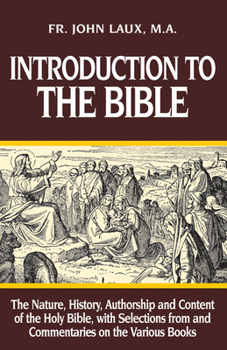Book Overview
Fr. John Laux's timeless text thoroughly explains the philosophical and theological foundations of Catholic doctrine regarding God's inspired Word as well as a book-by-book analysis of the Bible. In Introduction to the Bible, readers uncover the truths of Sacred Scripture and associated commentaries covering the Historical, Doctrinal, and Prophetic books of the Old and Testaments. Recommended for 11th-grade students enrolled in TAN Academy.
Format:Paperback
Language:English
ISBN:0895553961
ISBN13:9780895553966
Release Date:January 1932
Publisher:Tan Books
Length:352 Pages
Weight:1.04 lbs.
Dimensions:0.9" x 5.7" x 8.2"
Customer Reviews
1 rating
Father Laux Did His Homework
Published by Thriftbooks.com User , 17 years ago
Father Laux's INTRODUCTION TO THE BIBLE is a very useful, instructive assessment of the Bible, biblical history, and "secular" history of the Ancient Middle East. Father Laux gives readers very good historical background to the Bible, and readers whether they are Catholic or not can benefit from this book. This reviewer disagrees with Father Laux on The Documentary Hypothesis of the Torah or first five books of the Bible. In spite of this fact, this disagreement does not undermine the value of the book. Had Father Laux lived long enough to examine the Dead Sea Scrolls and other recently discovered sources, he may have modfied his views. Father Laux is obviously a partisan of Catholcism and the Catholic Church. Anyone who critisizes him for that is wasting their time. Father Laux was very clear about his religious loyalties. Readers should know this in no way detracts from the value of the book. Father Laux's presentation of other books of the Hebrew Bible or Old Testament is very enlightening. He gives readers of the political forces and challenges faced by the Ancient Hebrews, and he explains the religious disputes among different Judean factions. The book gives readers a concise view of Ancient Hebrew social history which in turn gives the reader a better understanding of irate Ancient Hebrew Prophets who railed against social injustice, violations of religious codes, and blatent hypocracy. Father Laux's placing the Prophetic Books and Books of Poetry in proper historical context make reading the Bible easier and with more understanding. One feature of Father Laux's book was his handling of Hebrew poetry such as Job, the Pslams, Proverbs, etc. Father Laux did a masterful job in enlightening readers to this part of the Bible. While this reviewer disagrees with Father Laux's intrepretation of the book titled Canticles of Canticles or Song of Songs, Father Laux's commentary is very good. Father Laux gives readers escellent coverage of the Apocrophy. Readers may know that the Catholic Bible has seven books that are not in most Protestant bibles. These books are Judeth, Tobit or Tobius, Ecclesiasticus not to be confused with Ecclesiastes, Wisdom, and First and Second Maccabees. His explanation of why the Early Church Fathers accepted these books as canonical is clear and understandable. His remarks re St. Jerome (346-420)inclusion of these books in St. Jerome's Vulgate Bible gives readers good reasons of why the Catholic Church includes these books. Father Laux's explanation of the New Testament is just as good as his explanation of the Old Testament. He gives the reader some insight to the use of the Aramaic and Greek languages. He explains the Synoptic problem and offers intelligent solutions. A very valuable part of his explanation of the New Testament is his careful description of the differences of the "Jewish" Christians who originated in Judea and the Gentile Christians who originated outside of Judea. He cites the





